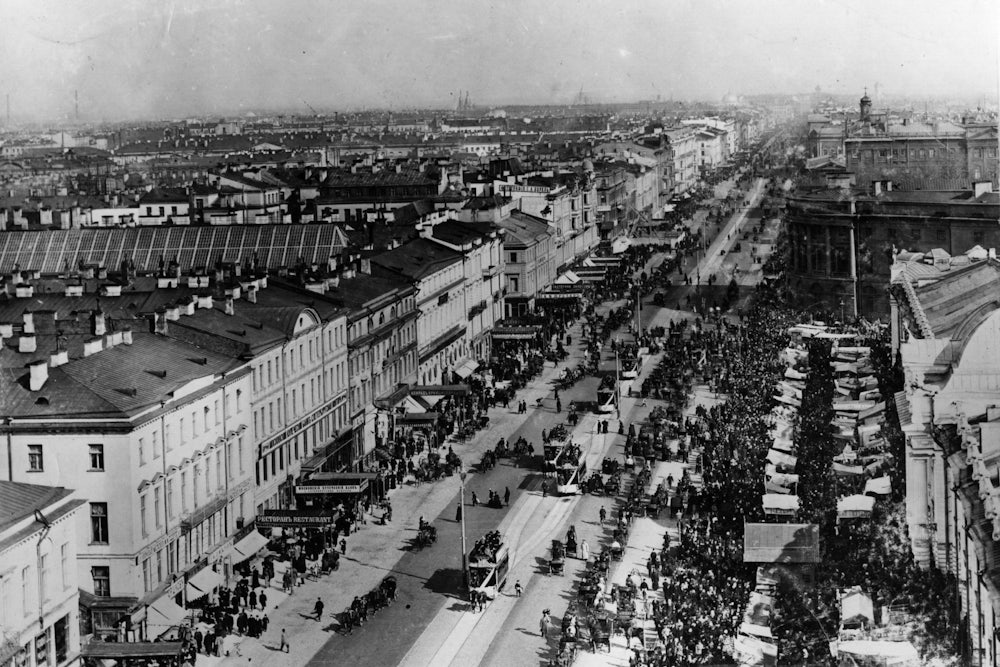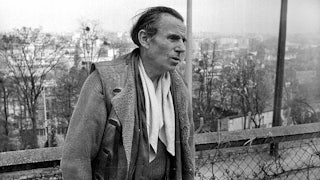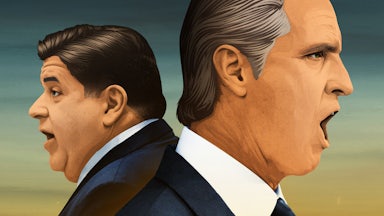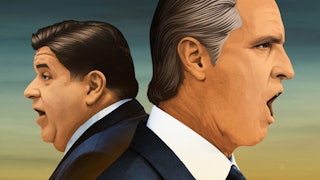To me, the saddest and most disturbing feature of this recent preoccupation of so many of our people with the problem of Communist penetration within our country is that it tends to rivet our attention upon ourselves, to seize us up in a sort of cramp of introspection, and to interfere in the most unhappy way with the attention which we ought to be giving to things outside of our own society, and particularly to the regime and the people of the Soviet Union.
This heightened concern with the question of who among us is and who is not “a Communist” rests of course on the feeling that present with us in this world is something dreadful and unspeakable, something infinitely abhorrent, something incurable and incorrigible, which is not only hostile to us but is hopelessly committed to that hostility: something with which it is of no use for us to try to reason, which we must either destroy or be destroyed by. This is all right as far as it goes, I think, provided that “something” be taken to mean certain concepts, now loose in our world, concerning the relations between the strong and the weak, between those who are the subjects of state power and those who are its objects. But the witch hunting which is in progress seems to embody two further propositions which strike me as questionable and dangerous in the extreme.
The first of these is that this force of evil is something entirely outside of ourselves: the expression of some inexplicable wickedness, conceived far away and without relation to us, a wickedness of which we ourselves can be, and are, spotlessly innocent. The second is that there are no gradations involved in the influence of this force on people: that it is like the mumps or pregnancy—either you have it or you don’t, either you are or you are not; and that those that “are” are to be regarded as lost to all good purposes. If they are part of our own American society, then they may be permitted to go on living; but they are found out, exposed, and thrust from our social midst. They are like the villain at the happy ending of the movie: we feel no obligation toward their moral reconstruction; we don’t care what happens to them; they have disappeared from our ken, and good riddance.
These assumptions are dangerous even in their application to the patty members who ostensibly constitute the foundation of the Soviet regime. I was much impressed with the warning recently uttered by Angelo Rossi, who was once a member of the Executive Committee of the Comintern and one of the first prominent Communists to leave the movement. In the chapter on the Communist Party and democracy, in his recent book about the French Communists, you will find the following passage:
... Error is always the result of a defeat suffered by truth on its own territory, so that every attempt to fight error as if It were born beyond the frontiers of truth, every attempt to treat error as a clan treats its external enemy, not only fails as a matter of course but prevents the application of the only effective remedy. Error must, in a word, always be regarded as a crisis in the internal development of truth ...
I am sure that Rossi is right. Whatever may have happened to them through environmental influence, the Communists are human beings. Each one of them once lay in a cradle and had affection and tenderness lavished upon him by some adult who probably wished for him a normal and successful and adjusted participation in life. If today these people are lost to themselves and to society, as I am sure most of them are in the sense that they have placed heavy handicaps on their ability to contribute anything positive to their own peace of mind or to general progress, if today they find themselves dedicated to a negative and destructive cause, this is because they had certain vulnerabilities and weaknesses, which are common to at least an important percentage of human beings if they are not present to some degree in all of us, and because these vulnerabilities and weaknesses were discovered and exploited by others who were already embittered against the world which had fostered them, and were not averse to practising this form of cynicism.
Let us not be too snobbish about these things. Let us not be too haughty to give thoughtful and dispassionate attention to these same vulnerabilities and weaknesses, to the things which cause people to become the agents of totalitarianism. Perhaps we will find some of them in ourselves. Perhaps we will find that we are encouraging their growth in others by the ways in which we conduct our society.
But if these assumptions which I mentioned are dangerous to our understanding of the Communist movement itself, how much more so when it comes to our understanding of the mass of the Russian people. For the insistence that we shall be blind to everything but black and white in these matters leaves no proper place for these Russian masses, who are all obliged to do lip service to Communism. It has the tendency to stamp them all as our enemies, and at the same time to suggest to us that we have nothing to learn from them, no reason to occupy ourselves with them, no reason to try to put ourselves in their position and think in their terms—that this, in fact, would be a dangerous sort of flirtation with the Devil, a stirring around in murky depths, from which no good could come.
And it is this which I particularly deplore, and view with alarm. I cannot escape the conviction that the experiences of the Russian people, in the past as in the 13 present, will be found—as the scroll of history unrolls itself further—to have a considerable relevance to the things which we in this country are now experiencing, and are yet to experience.
Some of you may be skeptical. I would not blame you if you were. Where, you may ask, is this relevance I speak about? You may point to the uniqueness of the entire Russian national experience: to the derivation of Russia’s Christianity from Byzantium instead of Rome; to the powerful influence of the Tatar masters over the course of centuries; to the isolation of the Russian people from the main currents of civilization during the most important formative period of their national consciousness; to the absence of a respectable tradition of capitalism; to the tardy and inadequate development of a middle class comparable to the middle class of Western countries in sturdiness and self-assurance.
You may point to the epic unhappiness of man’s entire effort to lead a civilized existence on the Russian plain: to the misery, the degradation, the brutality, the almost wearisome regularity of the triumphs of violence over moderation throughout Russia’s history. You may say that we are dealing here with a people lost to progress and to hope, with a realm over which there hovers some relentless hand of failure, with a climate in which only the demoniac, self-destructive tendencies of man’s nature can survive; and that we had best wall ourselves off from it, protect ourselves from its contamination, wipe it from our consciousness, and pray to our gods that it may remain well distant from us.
You will even find strong support from Russians themselves for the view that their history has little relation to that of the rest of the world. Remember Chayadayev’s words, in the “Philosophic Letter”:
... We have never walked hand in hand with other nations. We do not belong to any of the great families of mankind, either to the West or to the East, we do not have the tradition of either. We exist as if beyond the limits of time and as if we were never touched by the universal education of humanity.... We came to this world as illegitimate children, without any heritage, without any connection with the people who preceded.... We have no independent evolution of our own.... We grow but we do not mature ...
And yet Chayadayev himself firmly believed that some day Russia would have something to offer to the rest of the world. He expressed it somewhat grimly, and cryptically, and you can take it in more ways than one; but the thought was there. We exist, he wrote,
... I’ll order to teach the world a lesson when the time comes. Such a destiny will, undoubtedly, be useful. But who knows when we shall find our place among mankind, and how many misfortunes we are fated to suffer, before our destinies are fulfilled ...
Who knows, indeed? I have no strong optimistic convictions on this score. The only lesson taught by Russian political experience recently seems to have been a negative one. And certainly the greatest caution is due in drawing any parallels or connections between Russian phenomena and those of a country such as our own.
Yet any one of us who has lived in Russia for any length of time and has occupied himself seriously with Russian realities knows that there have been phenomena in Russian life which speak with tremendous power and meaning to the American perception: strivings which every American instinctively understands, manifestations of human feeling which are not only entirely comprehensible to our world of thought but which leave us with a feeling of wonder and excitement at their scope and boldness and emotional intensity. Most of these seem to me to relate to what we might call the Petersburg era in Russian history, and primarily to the nineteenth century, which was of course the period of maximum exposure of Russian society to Western influence. Western influence in those days meant European influence; but European influence, mind you, at a time when the artistic and intellectual currents of old Europe were themselves never more alive, never more interesting, never more subject to astonishing and infectious changes.
In this sense, we might almost say that what Americans find meaningful and moving in Russian history is the reaction of the Russian people to impulses from without. It is not the isolated Russia—not the Grand Duchy of Muscovy, vegetating through the decades and centuries in its archaic darkness and intolerance, its bigotry and cruelty, and its fear and hatred of the foreigner—not the Soviet despotism, living in a world of thought based on a desperate distortion of the image of the world around it, and reminiscent of the old Muscovy in so many ways besides just the return of the capital to Moscow—it is not this Russia in isolation which has produced the things that seize and hold us; it is the Russia touched by the stream of Western civilization, reacting to that stream with the incredible freshness and sincerity and clarity of perception which placed the Russian intellectuals of the nineteenth century among the greatest of all critics of contemporary Western civilization—not only reacting to that stream, but, which is even mere important, striving with tremendous intellectual and moral courage to take from it that which was useful and hopeful and apply it to Russia itself, in order that there might be light where there had been darkness, that the immense backwardness and unhappiness might be overcome and that new vistas might be opened up for the expenditure of human energy and the realization of human dreams.
Please do not think from this that I am speaking of any idealization or slavish imitation of the West on the part of the Russian intellectuals. Their attitude toward Western culture was always a dual and a tortured one, combining both love and hatred. I am only saying that Russia has been at her greatest when stimulated, or stung into reaction, if you will, by contact with the West, and that accordingly the unfolding of the Russian spirit in the nineteenth century was one of the great chapters in the history of civilization. Never have more inspiring blows been struck for things which commend themselves to us as hopeful and progressive.
You will find no literature more promising in the possibilities to which it pointed than the poetry of Pushkin. You will find no more gracious and yet telling caricature of the faults of a society than Griboedov’s immortal comedy. You will find no clearer and brighter flame of liberal convictions than in the writings of Chernyshevski and Alexander Herzen; no more profound reexamination and testing of Christian ethics than in Dostoevsky; no more brilliant and masterful fictional portrayal of a society than in Tolstoy; no purer example of liberal humanism and honest literary workmanship than Anton Chekhov, and no brighter page in the history of dramatic art than those first performances of the Moscow Art Theatre at the close of the century, touching new springs in the human consciousness, opening up new possibilities in the communication of emotional experience.
Here, in these intellectual and artistic strivings on the part of many Russian people in the nineteenth century, was an effort, breath-taking in its suddenness and vitality, to overcome huge handicaps which history had placed upon the development of a great people, and to overcome them—in contrast to the efforts of the Russian Communists—in a way compatible with human decency and respectful of human dignity.
These things have their own significance if they are taken for themselves; if we approach them, that is, in a wholly detached and scholarly spirit, trying to place ourselves in the mental framework of a Russian of that day. But when we speak—as we are speaking here— of their relevance to our own troubles in this country, in the middle of the twentieth century, we have a harder problem. For the signal fact about this amazing liberal development in Russia in the nineteenth century was its ostensible failure: the fact that it was followed not by the betterment of Russian conditions to which it was really addressed, but by the establishment of the first and (as time was to show) the most durable of the modern totalitarian states—of these regimented societies dominated by ruling groups devoid of ethical restraint in the exercise of their power, devoid of the humility inherent in most religious belief, devoid of even that minimal modification of conduct which was implicit in the obligation of the hereditary monarch to tradition, to the family name, to the institution of the Crown as such.
Leading as it did to this solution, and to the extent that it had responsibility for it, one hundred years of liberal effort ended in a situation which could not have been more destructive to its own development; for the workings of Soviet power have extinguished completely, on the surface at least and in the creative sense, the flame of the Russian intellect and spirit that burned so brightly and hopefully in the nineteenth century. Obviously the Soviet leaders have found these stirrings more intolerable to their power than did the Czarist regime to its own. Or perhaps they are just more prescient. Perhaps their keener nose for the realities of power tells them that the free manifestation of the Russian spirit is intolerable to any despotic government; and that to attempt to tolerate it would oblige them to expose their regime to tests which they know it could not successfully meet.
What is the significance of this catastrophic outcome of a thrilling century of Russian effort? What fault were these people guilty of which led to this result? Or were they not the guilty ones at all. And what has remained of their efforts and their contribution in Russian society of today?
These are not questions which we can decide in a hurry. They are questions which lie before American scholarship in the Russian field. Many people will have to contribute to the finding of the answers.
What I am about to say, therefore, is not by way of answer to these questions I have raised, but only by way of commentary, in order that the questions themselves may be clearer. The causes of the apparent collapse of Russian liberalism as a political movement are not hard to discern. Viewed against the broad background of Russian history, the Petersburg era appears as an artificial episode symbolized by the removal of the capital from Moscow to a region devoid of any traditional association with the growth of the Russian state. Tremendous things were accomplished on the surface of Russian life during that period; but it sometimes seems as though the real national consciousness of the Russian people—the consciousness which can alone give final validity and solidity to outlooks and institutions— only slumbered on, relatively untouched, until the latter part of the period, and was then simply unsettled, economically and socially, rather than inspired intellectually and politically.
There was also widespread doubt among the liberal intellectuals themselves as to the immediate applicability of their liberal ideas in Russian political life. Some of them, of course, like Nechayev and Bakunin, tipped all the way over and embraced a political philosophy which could not have been mote reactionary and led directly to totalitarianism. But many of the others entertained doubts, from time to time, about the possibility of Russia’s “skipping over” any stages in the slow, organic advance toward representative government and were therefore skeptical of the possibility of abrupt and sudden changes.
As a matter of fact, it was as though many of these Russian intellectuals, notably Gogol, Tolstoy and Dostoevsky, sensed that the Hegelian-Prussian origins of nineteenth-century liberalism contained in themselves the seeds of their own destruction in the philosophic sense.
To this we must add a reflection that the final decades before the revolution witnessed in Russia, side by side with some of the most primitive economic conditions, a precocious advance of certain branches of the Russian economy toward the most modern type of bigness and monopoly. We know from our own experience that such development can tax liberal ideas and institutions even in the most advanced democratic societies. No wonder, then, that in Russia it proved quite disruptive in its effect on the development of democratic ideas, and threw the Russian labor movement, in particular, largely into the hands of antiliberal extremists.
In the light of this background, while in a certain small area the Bolshevik Revolution represented a response to the pressure of new and modern problems, in a far greater area it represented a reversion to old and familiar concepts. It is not surprising, therefore, that the Soviet regime today has a strongly atavistic flavor. There is relatively little in it, in fact, for which precedent cannot be found in the annals of the Grand Duchy of Muscovy. It is more similar to these archaic patterns than to the other totalitarian regimes of our time which were partly inspired by it.
In this sense, it can claim for its concepts and methods a sort of unhappy legitimacy; and we must not underrate the force of familiarity by which these concepts and methods are anchored in Russian society. It has always seemed to me that the most terrifying phenomenon in Russian political life is something which is present to some degree in almost every government but seems in Russia to be a dominant and central feature: namely, the tendency of the crueler, more brutal and more aggressive natures to rise by some sort of natural attraction to the political surface of society and to monopolize the business of government. In this way, government becomes the function of a certain mutation of the species: the mutation which ought least to have anything to do with it.
Nowhere else in the world does the concept appear to be so deeply rooted in the people’s minds that the power of the state is now, always has been, and always, will be, evil; and that this is normal and something to be accepted. Departing from such an attitude, people refrain from applying moral standards to the acts of the political power. For them, it is like an elementary force: amoral, dangerous, uncontrollable, unaccountable. The finer spirits tend to steer away from participation in it. And the Kremlin, by maintaining that most abominable of modern political innovations—the concentration-camp system—tries to assure itself that brutality will not die for lack of fodder to work on and that there can always be maintained a steady fund of human spirits sufficiently exercised in brutality to assure the continuation of the system.
The concentration camps, we must hope, will someday pass from the picture, for they turn the stomach of humanity and are unreconcilable even with the theory of the Soviet state. What sort of socialism can this be which, after thirty-three years of power, admittedly continues to turn so many of its citizens into criminals that millions of them must, at any given time, be found enduring the hardships of a purgatory or a hell on earth?
But whether the camps go or not, I think we must recognize that the political concepts with which the Russian people are conversant have not been happy ones, that they were not substantially modified by the cultural movements of the Petersburg era, and that it may be a long time, if ever, before we can expect to see the development in that country of political institutions which will answer to our concepts of liberality and democracy.
Fortunately, this applies strictly to the political field. When you get beyond that field, you get a much different and more encouraging picture. I refer to the widespread survival in a great part of the popular mind of concepts in the field of individual ethics which have nothing to do with the ideological world of the present regime and are unquestionably planted by this intellectual and artistic movement of the nineteenth century which I have just mentioned. You see the evidences of them on every hand. All you have to do is to listen to the stream of casual conversation among Russian people anywhere, on the streets, in the parks, in the public conveyances, to confirm that an impressive number of Russian people still believe profoundly in certain abstractions such as decency, honesty, kindliness and loyalty in the relations between individuals, where- as in the official mind these things are not supposed to be abstractions at all but only something relative to the pursuit of the aims of the party.
In addition to that, it is impressive to note what a powerful hold the past has on the contemporary Russian public in the fields of art and literature. This may not be agreeable to the regime, and evidently is not wholly so, judging by the rather embarrassed vacillations of policy with which it has treated questions involving the legitimacy of past manifestations of Russian culture.
Yet no one has replaced Pushkin and Tolstoy in the affections and respect of the Russian public. No one, not even Shostakovich, has eclipsed Moussorgsky or Tchaikovsky. The Moscow Kremlin and the Palaces of Leningrad remain the pride of Russian architecture. The Moscow Art Theatre is still the foremost theatre of the Soviet Union. And when you go today to the ballet at the Bolshoi Theatre in Moscow, what do you find? You find intact and living before your eyes, as the symbolic embodiment of all that is colorful and stirring and dramatic in life, the fairytale world of the age of chivalry: the royal court, the Prince Charming, the imperiled maiden, the evil sorcerer, and the fairy godmother who is always more powerful than the evil sorcerer. And the story ends with the king and queen sitting serenely on their throne, in gorgeous, regal robes, amid their assembled courtiers, while before them take place the dances of elation and gratitude which connote the happy ending, the final dissipation of all the black clouds, the victory of that which was kindly and gentle and compassionate over the evil spirit which had threatened the dignity and happiness of man. And every night throughout the year, the great theatre is crowded by an audience of at least two thousand Russians; and every one of these, irrespective of his rank or his stature or his party membership, follows with avid interest this pantomime enactment of the struggle of conflicting moral forces in the human breast, identifies himself with the power of good, finds the symbols appropriate and familiar, and approves the outcome.
You cannot tell me that in these Russian minds the lessons of the nineteenth century have been lost. In the realm of the organized power of man over man, the forces of retrogression may have asserted themselves for the present, and the immediate future may be problematical. But in the realm of the spirit, there is a moral life being led under the noses of the regime and despite anything the regime may do to stop it. Individual moral concepts cannot remain permanently separable from the problem of how man treats man within the framework of state power. And I am sure that this organic development of moral feeling, so closely linked with the great figures of Russia’s cultural past, must some day take its place in the creation of new political forms. These forms may not, I reiterate, be ones strongly similar to our own or to those others which we are accustomed to recognize as democratic. But we may hope that they will be ones expressive of the immense good, of the immense faith in humanity, which is still present, and perhaps more widely present today than ever before, in the Russian spirit.






